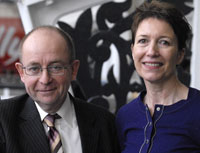
Employers are using personalisation as an excuse to replace social workers with unqualified staff, the College of Social Work has warned in its most strongly-worded critique of the sector’s health to date.
In an exclusive article for Community Care, College co-chairs Maurice Bates and Corinne May-Chahal warn that the erosion of the role of social workers is likely to continue as a result of widespread spending cuts.
The College’s joint leaders write: “Personalisation has sometimes been used as cover for replacing social workers with a fancy array of job titles united by a common characteristic – they are cheaper to employ. As the financial cuts bite, employers will be tempted to extend the practice.”
Employers have been able to do this because social work has struggled to define itself as a profession, the co-chairs say.
The College is now seeking to counter the problem by drawing up a set of “reserved functions” that should only be carried out by social workers, such as child protection inquiries. No publication date has yet been set for its work.
The College has already published a 12-page document highlighting the contribution social work plays to society, specifying situations in which qualified social workers should intervene, for instance when addressing family breakdown.
The Social Work Action Network (Swan) agreed that the profession faced a huge task to safeguard its future throughout the austerity programme.
“Some social work jobs could be undertaken by non-trained workers – for less money and on poorer working conditions, and it will narrow the space for social workers to do creative, ethical and value-driven work,” said Michael Lavalette, Swan’s national co-ordinator. “There is a real danger that it will reduce social work to a mere work task, rather than the rich, creative profession that it can and should be.”
Allan Bowman, chair of the Social Care Institute for Excellence, insisted that social workers had a “distinct contribution to make to personalised support”.
“As the lead profession within social care, social workers understand the systems, legislation, professional partnerships and interpersonal relationships needed to deliver personal care. They are vital to the future of self-directed care,” he said.
In recent weeks concern has been expressed over the use of non-social workers to reassess the needs of service users as many councils tighten eligibility.
BASW – The College of Social Work has warned that assessors without social work qualifications could be less assertive in standing up for service users and more prone to misunderstanding family dynamics or failing to spot adult abuse. The concern was echoed by the National Council for Independent Living.
The Department of Health’s Vision for Adult Social Care, published in November last year, listed social workers among several groups of professionals described as “crucial to delivering personalisation”.
However, it added that “new and continuing professional roles will be developed for frontline social workers, occupational therapists, nurses and others”.
What do you think? Join the debate on CareSpace
Keep up to date with the latest developments in social care. Sign up to our daily and weekly emails
Related articles


 A trauma-informed approach to social work: practice tips
A trauma-informed approach to social work: practice tips  Problem gambling: how to recognise the warning signs
Problem gambling: how to recognise the warning signs 




 Find out how to develop your emotional resilience with our free downloadable guide
Find out how to develop your emotional resilience with our free downloadable guide  Develop your social work career with Community Care’s Careers and Training Guide
Develop your social work career with Community Care’s Careers and Training Guide  ‘Dear Sajid Javid: please end the inappropriate detention of autistic people and those with learning disabilities’
‘Dear Sajid Javid: please end the inappropriate detention of autistic people and those with learning disabilities’ Ofsted calls for power to scrutinise children’s home groups
Ofsted calls for power to scrutinise children’s home groups Seven in eight commissioners paying below ‘minimum rate for home care’
Seven in eight commissioners paying below ‘minimum rate for home care’
 Facebook
Facebook X
X LinkedIn
LinkedIn Instagram
Instagram
Comments are closed.